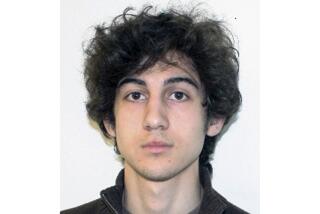Prosecutors urge judge to reverse decision on 9/11 defendant
Prosecutors in the military case against five accused Sept. 11 plotters urged a judge Monday to reverse his decision to allow a separate trial for one of the defendants, who has shown signs of severe mental problems after years of incarceration at CIA interrogation sites and Guantanamo Bay, Cuba.
The judge, Army Col. James L. Pohl, ordered a separate capital murder trial for Ramzi Binalshibh, the accused Sept. 11 plot cell manager, last month. Pohl and others have questioned whether Binalshibh understands the case against him and can assist in his defense. In addition, his lawyers have accused the FBI of improperly trying to interfere with Binalshibh’s defense.
Pohl acknowledged Monday that he made the decision without input from lawyers on either side.
Prosecutors warned that the judge’s ruling on Binalshibh, a top Al Qaeda operative, may encourage the other defendants to raise similar insanity claims and seek their own separate trials. Already, lawyers for Mustafa Ahmed Hawsawi, a Saudi, are seeking a separate trial because of lengthy legal delays.
All five were arraigned on capital murder charges more than two years ago, and no trial date is expected soon. They have all pleaded not guilty.
Pohl, during a hearing simulcast Monday at Ft. Meade, said that he would rule shortly on the request to reconsider trying Binalshibh separately.
Prosecutor Clayton Trivett said the judge’s decision was a “drastic measure” and he should reconsider it. He suggested that any decisions on whether to try some of the defendants separately should come later in the pretrial process, perhaps this fall.
“I cannot emphasize how serious the impact would be on the 2,976 victims in this case,” Trivett told the judge, referring to those killed on Sept. 11, 2001. “The government has over 100 trial witnesses and over 200 family members who want to testify in the sentencing phase, should there be one.”
Trivett added that the charges against all five defendants, including accused mastermind Khalid Shaikh Mohammed, were drawn as a “joint” effort to bring justice to the top individuals as a group and hold what probably will be the only death penalty case in the worst terrorist attack in the United States.
“They are all charged with the same conspiracy,” Trivett said. “They are all charged as principals for the murders. They all knew each other and were acting in concert with one another.”
James Harrington, Binalshibh’s chief attorney, said he had not decided whether to support a separate trial for his client.
“We’ve had discussions with our client about it and they are ongoing discussions,” Harrington said. “It is a difficult issue for him to understand. I’m not sure he fully understands it right now, the pros and cons.”
But signs that Binalshibh, a 42-year-old Yemeni, is mentally unstable have been evident. Along with the other four defendants, he was brought to Guantanamo in 2006 after several years in secret CIA and U.S. military holding sites for interrogation. Two years later, a military medical board found that Binalshibh suffered from “severe mental disease.” He often has been taking anti-psychotic medication.
He has repeatedly interrupted court proceedings, sometimes standing and complaining about the detention center, the U.S. government and the charges against all five men. Despite all that, his lawyers have not formally asserted that he is mentally incompetent.
Trivett complained that the case was bogged down in pretrial proceedings because of defense lawyers’ delays. “This is a capital case, and every day their clients are still living is a victory for them,” he said.
Army Brig. Gen. Mark Martins, the chief prosecutor, defended the military tribunal process in a statement released before Monday’s hearings. He said the case was moving “toward trial, however unsatisfying the pace may be to observers.”
@RickSerranoLAT
More to Read
Start your day right
Sign up for Essential California for news, features and recommendations from the L.A. Times and beyond in your inbox six days a week.
You may occasionally receive promotional content from the Los Angeles Times.







